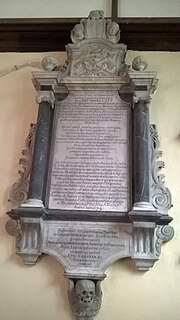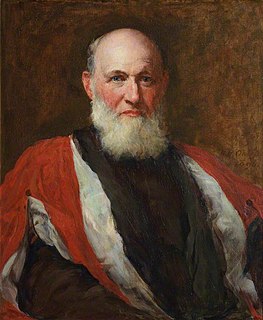

Francis Barnes (13 January 1744 - 1 May 1838) was an English philosopher and a Knightbridge Professor of Philosophy.


Francis Barnes (13 January 1744 - 1 May 1838) was an English philosopher and a Knightbridge Professor of Philosophy.
Barnes was born in Bolton-le-Sands, Lancashire the son of Joseph Barnes a yeoman farmer. He attended local schools at Kellett and Silverdale, but his teachers noticed his abilities and he won a place at Eton College. His family were not wealthy and it was said that he travelled to Eton seated behind his father on one of the farm's horses. [1] After finishing his schooling he went up to King's College, Cambridge. He graduated in 1764 at the age of twenty. [2]
Barnes took a Bachelor in Divinity and Doctor of Divinity at Cambridge in preparation for a career in the church. He was ordained in 1769 held various livings in Norwich and Wattisham, Suffolk, and became Vice-Provost of King's.
In 1788 Barnes became Vice-Chancellor of Cambridge University as well as Master of Peterhouse, Cambridge. His appointment to the latter post was highly contentious. He was only nominated to prevent the election of another man and had not particularly wanted the position. [3] It was said by a Peterhouse Fellow that he was unsuited to "any duty which required the exercise of high notions of morality, and a careful regard to what is just, decent, and venerable". [4] He held the Mastership for over 50 years.
In 1813 Barnes was elected to the Knightbridge Professorship of Moral Philosophy. As with his appointment to Master of Peterhouse, this election has been the subject of controversy. There were four electors for the vacant Professorship: the Vice-Chancellor, the Regius and the Lady Margaret's Professors of Divinity, and the Master of Peterhouse. The casting vote belonged to the last of these if the vote was split. There is a popular story that Barnes, as well as being Master of Peterhouse, was Vice-Chancellor; that as Vice-Chancellor, he nominated himself for the Professorship; that as Master of Peterhouse he seconded himself; and that, by two original votes and a casting vote, he elected himself to the Professorship. [5] The story is almost certainly apocryphal. Although Barnes had been Vice-Chancellor in 1788 and 1807, he did not hold the post in 1813, the year of his election to the Knightbridge. As was common for incumbents of the chair in the eighteenth and early nineteenth centuries, he seems to have given no lectures, [6] and did not publish anything.
Barnes had the distinction of being the last wearer of the eighteenth century wig in Cambridge University. [7] He died in 1838 at the age of 95 and is buried in the chapel at Peterhouse.
The Knightbridge Professorship of Philosophy is the senior professorship in philosophy at the University of Cambridge. There have been 22 Knightbridge professors, the incumbent being Rae Langton.

The Ascension Parish Burial Ground, formerly known as the burial ground for the parish of St Giles and St Peter's, is a cemetery off Huntingdon Road in Cambridge, England. Many notable University of Cambridge academics are buried there, including three Nobel Prize winners.

John Richardson was a Biblical scholar and a Master of Trinity College, Cambridge from 1615 until his death.
Stuart Alexander Donaldson was a schoolmaster, clergyman and Master of Magdalene College, Cambridge.
Robert Beaumont was Master of Trinity College, Cambridge from 1561 to 1567 and twice Vice-Chancellor of the University of Cambridge. During this time, he commissioned Hans Eworth to copy the 1537 Hans Holbein portrait of King Henry VIII. This copy was bequeathed to Trinity College where it hangs to this day.

Hon. Hugh Percy was an Anglican bishop who served as Bishop of Rochester (1827) and Bishop of Carlisle (1827–56).
Shallet Turner FRS LL. D. was a Fellow of Peterhouse, Cambridge, and a Fellow of the Royal Society. As Regius Professor of Modern history he was notorious for treating the position as a sinecure.
William Gretton (1736–1813), was the master of Magdalene College, Cambridge.
John Cole (1758–1819) was an Anglican priest and academic administrator at the University of Oxford.

An election for the Chancellorship of the University of Cambridge was held on 25–27 February 1847, after the death of the Duke of Northumberland. Many senior figures in the university hoped that Prince Albert, the Prince Consort could be persuaded to stand and be elected unopposed, but a group from St John's College approached the Earl of Powis, a St John's man. The election became politicised as Powis was a noted Conservative and his opponents feared the consequences from the Whig Government if he was elected. The result was close as the large number of non-resident Members of the Senate from St John's, and Conservative supporters, backed Powis, but the Prince was elected and agreed to take up the post. The election occurred at a critical point in the history of the University when it was pressed to reform, and the Prince Consort's election allowed progress to be made.

George Elwes Corrie was an English churchman and academic, Master of Jesus College, Cambridge from 1849.
William Buckmaster was an English cleric and academic, three times vice-chancellor of the University of Cambridge.

Thomas Smoult was the first Professor of Moral Theology or Casuistical Divinity in 1683 at the University of Cambridge to the post now known as the Knightbridge Professor of Philosophy. The professorship was founded in 1677 by John Knightbridge, a vicar of Spofforth in Yorkshire and Fellow of Peterhouse, Cambridge. He left a stipend of 50 pounds per annum. This was augmented by Smoult, who gave 300 pounds to purchase land.
George Borlase was an English churchman, Registrary and Knightbridge Professor of Moral Philosophy at the University of Cambridge.
Robert Towerson Cory was an English churchman and Professor of moral philosophy at the University of Cambridge.

James Porter was a British academic in the second half of the 19th century.

Thomas Worsley was an English academic and priest. He was the third Master of Downing College, Cambridge from 1836 until 1885.

William Hodgson was an English clergyman and academic, who served as Master of Peterhouse, Cambridge from 1838 until his death.
William Burgoyne was an English priest and academic at the University of Cambridge, who served as Lady Margaret's Professor of Divinity and Master of Peterhouse, Cambridge.

John Whalley was an English academic at the University of Cambridge, clergyman, and poet.
{{cite journal}}: Cite journal requires |journal= (help)